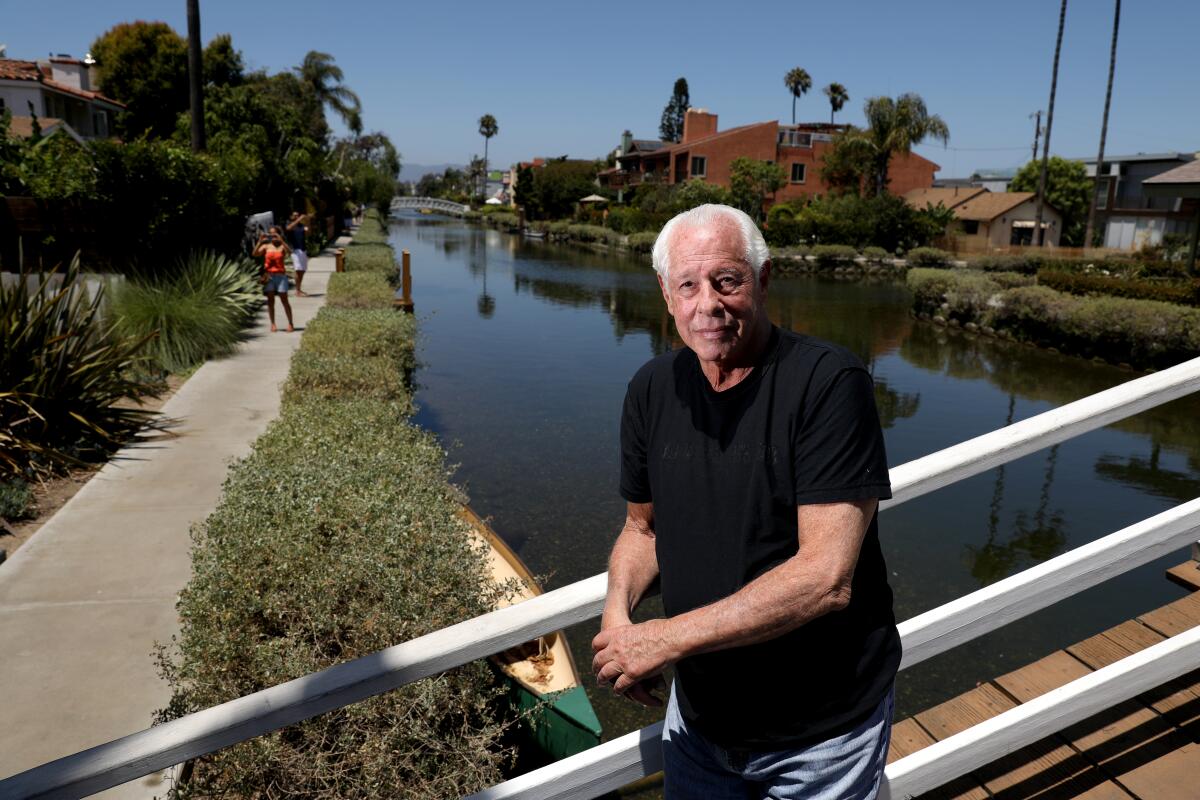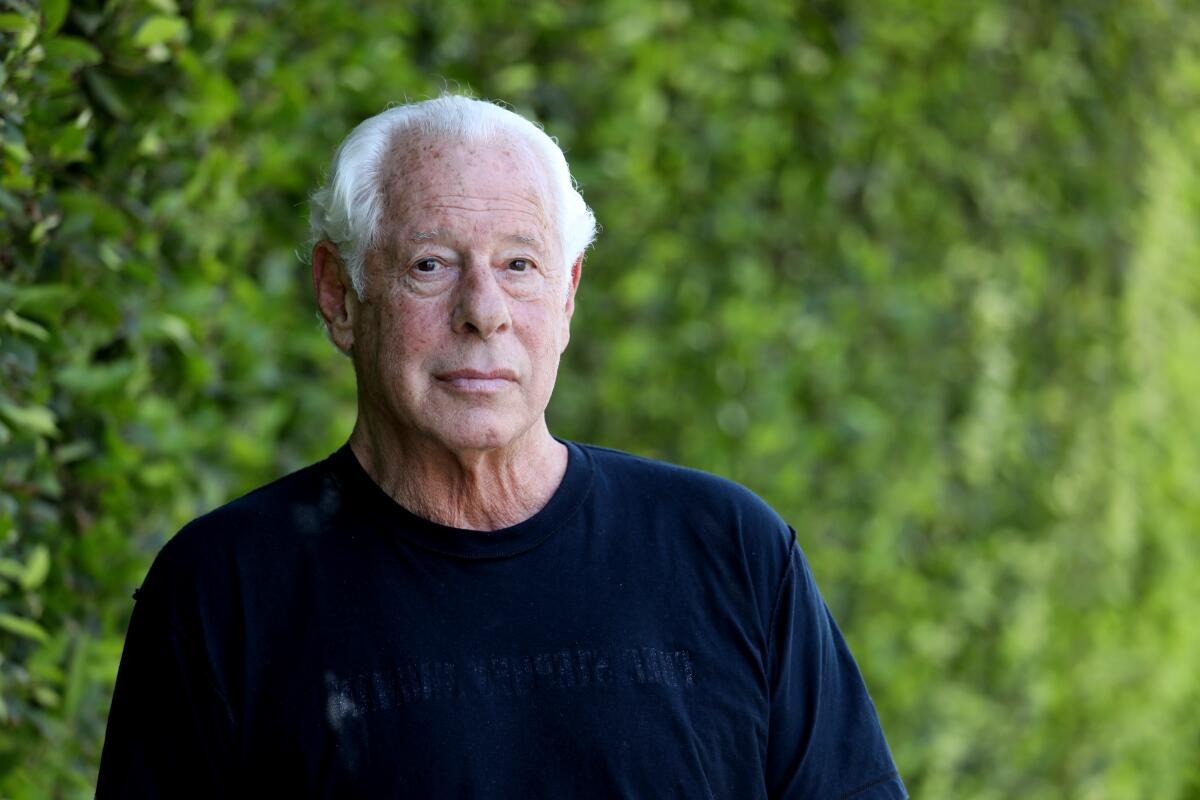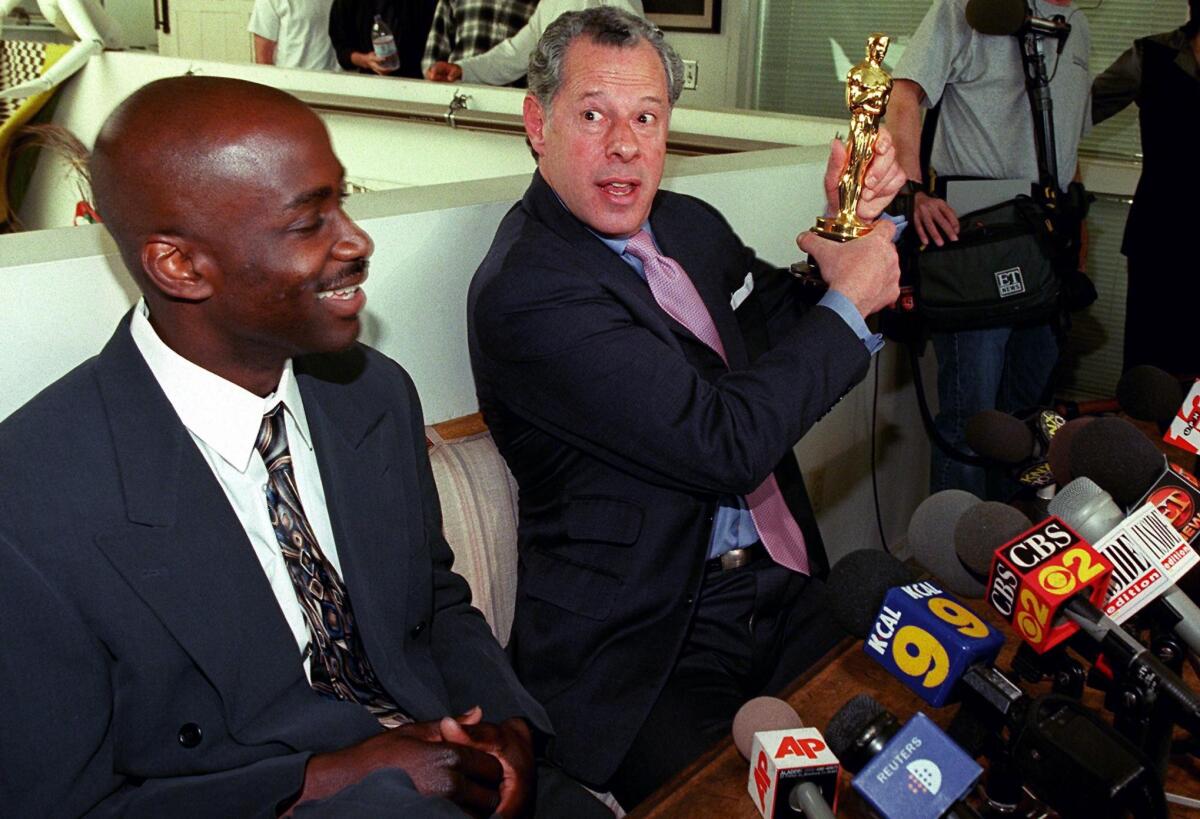A fraud conviction ended his battles for civil rights. 14 years later, Stephen Yagman is back

- Share via
It was an unusual plea for leniency.
Once-prominent civil rights lawyer Steve Yagman did not deserve prison, his numerous supporters told a federal court judge — even as they recited his manifest flaws: self-righteousness, arrogance and a messianic adherence to ideals others were too weak to live by.
For the record:
10:25 a.m. Oct. 8, 2021An earlier version of this article said that Chief Daryl Gates called Yagman “the personification of evil.” Yagman actually called Gates that.
“He alienated, possibly intentionally, all those that he thought were not making their way in life according to his beliefs,” wrote one backer, a former FBI agent who summed up the supplicant’s character as “abrasive, argumentative and obnoxious.”
Who was this lawyer whose prime virtue — a selfless dedication to the defenseless and downtrodden — could best be seen through a screen of negatives?
Yagman had tormented public officials for three decades with legal attacks on police abuse and government overreach.
Over a career that made headlines for landmark victories such as a six-figure judgment, later reversed, against LAPD Chief Daryl Gates, Yagman also became notorious for intemperance, most pointedly evidenced by his brutal characterization of a federal judge. In a letter to the publisher of the Almanac of the Federal Judiciary, Yagman wrote that the judge was “ignorant, dishonest, ill-tempered, and a bully,” going on to add “buffoon” and “sub-standard human.”
His suspension over the remarks was later overruled, but Yagman’s swagger eventually met ruin.
He abruptly disappeared from the public stage after his 2007 conviction for tax evasion, bankruptcy fraud and money laundering.
After serving 29 months in federal prison, he stayed largely out of sight for 11 years as a paralegal and lecturer.
Yet to the astonishment of those who might have welcomed his absence, Yagman has risen from his ashes and is once again brandishing the law. At 76, he has repassed the California bar exam — on his third try — and won a judgment in the State Bar Court of California to have his license reinstated.
No longer the sharply dressed, dour and almost don-like figure who appears in dozens of dated photos on the internet, Yagman, in casual shirts and walking with an easygoing gait, now blends in unnoticeably on strolls around his Venice home of 32 years. Out of concern for safety, he said, he would not meet at the house, instead conducting an interview in a nearby restaurant.
An erudite conversationalist with a deep voice and a trace of a Brooklyn accent, he reviews the past dispassionately, reciting victories and defeats with the same exhaustive detail as he recounts the reasons for two license suspensions and his falling out with notables such as constitutional scholar Erwin Chemerinsky, each a saga in its own right, intimating good intentions gone awry.
Though he speaks of himself today as more mature, neither age nor contrition has softened the brashness that won him the admiration of civil rights activists and equal disdain of those such as Gates, whom he once called “the personification of evil.”
With his court privileges restored, Yagman quickly filed a handful of cases that loudly proclaim his return as the champion of those he sees as harmed by an unjust system.
Yet in a departure from his lifelong focus on acts of government, Yagman this time is not only poking his finger in the eyes of public officials but also his own neighbors, taking on the cause of a woman who lives in an illegally parked RV that has stirred widespread contempt and fear in his Venice community.

He first filed two cases against the city over the law that restricts RV parking and an abortive attempt to tow his client’s vehicle. Then he filed suit against people in the neighborhood who have long been seething over the city’s inability to remove the RV. Horrified by the legal gambit, they dismiss Yagman as a hack who is using tortured legal theories to torment good citizens.
Before his conviction in 2007, Yagman left a significant imprint on civil rights litigation, establishing new case law on matters from police brutality to international relations.
Fellow civil rights attorney Robert L. Bastian Jr. wrote in Yagman’s plea for leniency that it is “scarcely possible to effectively argue any legal issue touching upon police or prison liability ... without citing, parsing and debating case holdings which are the product of his and his law firm’s dedication, commitment and engagement and passion for legal and social justice.”
Among dozens of breakthrough legal decisions listed in his 93-page resume are:
- Larez v. City of Los Angeles, one of his hundreds of cases against the LAPD, this one establishing that Los Angeles Police Department officers and their leaders can be held personally liable for civil rights violations.
- Children Who Want an Education v. Wilson, overturning the public school exclusion in Proposition 187, the 1994 statewide vote to deny public services to undocumented immigrants.
- Gherebi v. Bush, with former U.S. Atty. Gen. Ramsey Clark, leading to a Supreme Court decision that prisoners at the Guantanamo Bay detention center had a right to due process.
- And Standing Committee on Discipline v. Yagman, which found that attorneys — Yagman in particular — have a 1st Amendment right to use “rhetorical hyperbole” in criticizing a federal judge without facing discipline.
As a civil rights lawyer, Yagman says, he chooses his cases for their importance regardless of the potential for financial gain or chances of success.
“I really like small cases where people have been oppressed or bullied but don’t have a lot of damages,” he said in the interview. “That’s my specialty — small cases that will turn into federal cases. I think that makes a big impression on the Police Department.”
He says he demands upfront that his clients agree not to settle.

“Because the way you make a point, and the way you change the system of policing, is by going to trial,” he said. “Nothing changes if you accept a settlement. So, I never ever made, nor will I make, a settlement demand.”
The judgments may not be great, but under federal civil rights laws, Yagman can collect healthy attorney’s fees if he wins.
In some instances, however, Yagman’s personal narrative conflicts with the record. In the 1980s, he was twice suspended by the California bar, once for taking “unconscionable” fees from a client.
And, by the late 1990s, his poor handling of money caught up with him, forcing him into bankruptcy.
In what many of Yagman’s defenders would characterize as an abuse of authority, the U.S. attorney’s office in Los Angeles obtained a 19-count grand jury indictment in 2006 on tax evasion, bankruptcy fraud and money laundering.
Prosecutors presented evidence that Yagman had failed to pay about $200,000 in taxes and hid assets in bankruptcy proceedings by moving money into accounts held by his then-girlfriend, now wife, K.D. Mattox.
A jury found him guilty on all counts. Six counts of money laundering were later thrown out by the judge.
Arguing for leniency, two dozen associates, judges and fellow attorneys filed statements on his behalf, many backing his defense that his prosecution was tainted by animus.

The most emotionally charged statement came from former FBI agent Kenneth Spielfogel, who recommended against prison time despite his personal animosity toward his former friend. Spielfogel told the judge he found “repugnant” Yagman’s participation in the manslaughter prosecution of an FBI sharpshooter who fatally shot the wife of separatist Randy Weaver during the notorious Ruby Ridge standoff. Yagman worked on behalf of the prosecution for four years before the case was dismissed in 2001.
Spielfogel said the two had become friends while living in the same New York apartment building. The relationship, like others of Yagman’s, ended in a falling out. It was just as Yagman and his then-wife, Marion, were moving to Los Angeles in the mid-1970s.
Almost three decades later, Spielfogel sided with his estranged friend over his former compatriots in the FBI.
“Even a brief look at the actions of law enforcement in this matter and at the charges themselves make it clear that the investigation and prosecution of Steve Yagman was improper from the outset,” Spielfogel wrote.
Dismissing that and other testimonials, and finding Yagman’s own testimony “transparently untrue in so many areas,” Judge Stephen V. Wilson sentenced Yagman to three years in prison, a milestone perceived as the end of the 62-year-old’s career as a litigator.
But, while removing Yagman from the public arena, his conviction and subsequent disbarment hardly stopped him from practicing the law.
Even while imprisoned at a federal penitentiary in North Carolina, Yagman provided legal assistance to other inmates, teaching them what books to read and how to file petitions.
“He taught me to write clearly and to think with a legal mindset and where to get information,” said fellow inmate Paul Emory, who continued to pass that knowledge on to others until his own release in 2014.
Once freed, Yagman rejoined his law partner (and, by then, ex-wife) Marion as a paralegal. He prepared witnesses, wrote memorandums and helped evaluate jurors. He became the plaintiff in several cases, including a series attempting to force four successive CIA directors to turn over the identities of agents who inflicted torture at so-called black sites. An appeals court ruled that Yagman’s request was too vague but broadened Freedom of Information Act case law by requiring the CIA to work with him in framing a viable request. He has not yet received the names.
He also resumed volunteering at the UCLA School of Law, teaching classes titled Law, Morality, and Social Justice and Police Brutality.
State bar rules required him to wait five years before applying for reinstatement, but he was in no hurry.
“I didn’t feel fit,” he said in the interview. “Being in prison upset me. It took a couple years to get right. I just wasn’t as happy as I should have been. It was traumatic.”
By 2017, the spark had returned. Two more years passed as he prepared his case for reinstatement, part of which involved gathering dozens of written testimonials from sources as diverse as a college philosophy teacher, a cardiac pathologist, a book editor and a handful of judges. Many had backed him at his sentencing 13 years earlier and reaffirmed their statements.
Chemerinsky, an estranged friend who had represented Yagman in an unsuccessful appeal, was not among them. He declined to comment on Yagman’s reinstatement.
But Yagman had no dearth of prominent defenders, among them Clark and federal judges including Dean D. Pregerson, who said he observed in more than 100 appearances before him that “Mr. Yagman fulfilled an important constitutional niche, in that he would take tough cases for plaintiffs who otherwise would be likely not to have had the benefit of counsel.”
Celebrated prosecutor Lea Purwin D’Agostino mirrored Spielfogel’s about-face.
“I frankly despised Stephen for what I believed were his outrageous statements and lawsuits directed towards law enforcement,” the retired deputy district attorney wrote in 2007. “Until I met Him!!! And then how rapidly my opinion changed!”
Taken by his “boyish, unabashed enthusiasm” and “unparalleled love and respect for the rule of law,” she also judged him nonmaterialistic.
Writing from prison in 2007, Amy L. Prien told the judge, “Mr. Yagman is still my counselor, my guardian, and my champion.”
Yagman had defended her at no cost, through a conviction, appeal and hung jury on murder charges in the methamphetamine death of her 3-month-old son.
“I would estimate Stephen spent tens of thousands of dollars out of his own pocket to ensure I received an adequate defense,” she wrote. “During the second trial, I was in custody. ... Stephen made me sandwiches, brought me delicious potato chips and lemonade.”
No longer incarcerated, she credits him with sparing her a 15-years-to-life sentence.
Nonetheless, the California bar opposed his reinstatement, leading to a trial in the State Bar Court.
Yagman said he accepts responsibility for his actions.
Backers who asserted that he was wrongly prosecuted also said he had expressed remorse, using carefully parsed words not focused on his criminal acts but the harm his actions had caused to the people close to him and potential clients who were denied his services.
Trial Judge Phong Wang, noting that the younger Yagman had “used his skills as an advocate to convince himself that his misconduct was okay at the time,” took him at his word that “he has evolved as a person” and acknowledged that he had repaid all his bankruptcy creditors.
Based on her favorable recommendation, the California Supreme Court on May 26 ordered Yagman’s license reinstated. The California bar did so in June, and his privileges to litigate in federal court followed.
He has quickly filed a flurry of cases on canvasses large and small.
His attempt to block the California recall election was quickly defeated when a federal judge deemed the election already underway and found no constitutional reason to stop it.
In several cases representing individuals, Yagman shows no lessening of his sharp differentiation between the just and unjust.
In one of his first lawsuits, representing the RV resident, C. Finley, Yagman portrays homeless people as victims of “government-sanctioned eugenics,” arguing that the city’s law prohibiting parking of oversized vehicles is designed “to alter, by government edict — here, a parking ordinance, a specific population that is disfavored by society and by government.” He filed similar cases against the city and county of Santa Barbara.
A second lawsuit accuses the city of Los Angeles of excessive force and cruel and unusual punishment in an April attempt to tow the RV while Finley was asleep inside it. The crew backed off and has not tried again. The black, spray-paint-decorated RV has been a fixture for about a year on Main Street behind Westminster Elementary School in a zone posted no parking from 7 a.m. to 5 p.m. Cars violating the prohibition are routinely towed, but not the RV. A city ordinance prohibits the towing of occupied vehicles.
It’s the third lawsuit, filed days after the others, that has turned Yagman against his neighbors. It accuses one named defendant who lives across the street from the RV and 20 who are not named, along with the security company some residents hired, of “thuggery and vigilantism” in their reaction to the RV. It seeks to recover compensatory and punitive damages amounting to a minimum of $3 million from each defendant.
While detailing no specific acts, it alleges two years of threats, “including the display of firearms ... to extort from plaintiff her right to reside at the place of her choosing.”
Several of the neighbors, who would only speak anonymously for fear of being added to the lawsuit, said they also see Finley as a victim, under the control of Ray White Jr., her husband.
According to several neighbors, who have surveillance videos that they say support their concerns, he verbally accosts passersby, plays loud music into the mornings, writes graffiti on walls and cars, steals trash cans, and frightens schoolchildren. The school has put up plastic baffles in the chain-link fence around its preschool to block children’s view of the RV.
The named defendant, Thomas Williams, did not respond to a call from The Times. A neighbor characterized him as “the nicest man” and father of two young children who has gone out of his way to help other homeless people and has had to hire an attorney to defend himself.
“Tom has it the worst of all of us,” the neighbor said.
The first of the four cases went before U.S. District Judge David O. Carter, who is hearing a landmark case filed by business groups alleging that the city and county have done too little to address homelessness. Without ruling on the constitutional issue, Carter let the no-parking law stand after being informed that the city does not enforce it.
Acknowledging that suing regular people is unusual for him, Yagman said it is consistent with his life’s work because it’s aimed at oppression.
“The oppression of our clients usually comes from the government, but sometimes it comes from vigilantes and thugs,” he said. “That’s the case here.”
True to his credo, Yagman said he has no interest in settling and intends to take the case to trial.
“I love trials,” he said. “I always have.”
More to Read
Sign up for Essential California
The most important California stories and recommendations in your inbox every morning.
You may occasionally receive promotional content from the Los Angeles Times.









